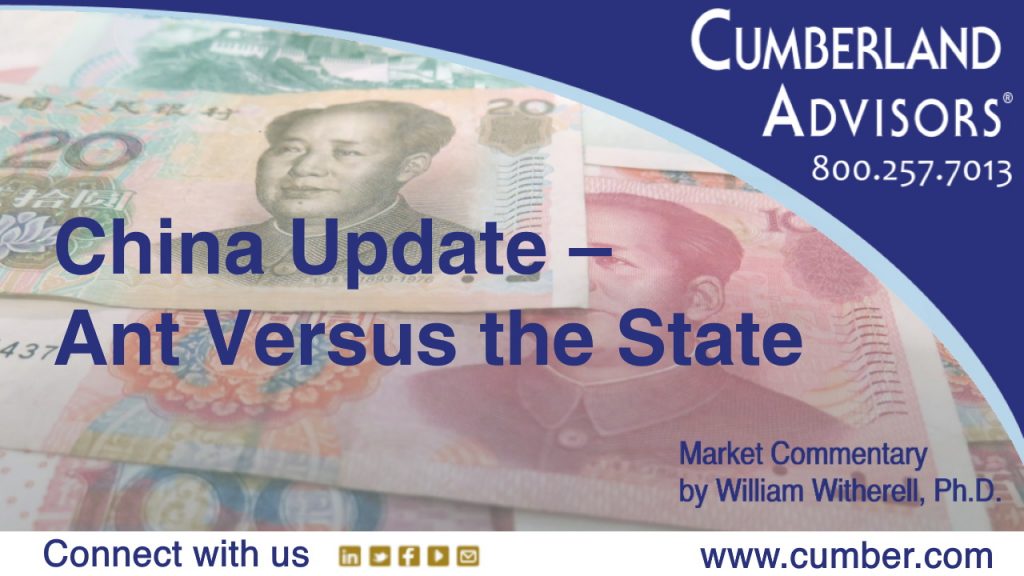Last week, the Ant Group was expected to list in Shanghai and Hong Kong the largest IPO in history. However, on Tuesday, November 3, the Shanghai Stock Exchange announced it had postponed the company’s listing, citing “major issues” that might cause it “not to meet the listing conditions or disclosure requirements.”
The IPO listing was also suspended in Hong Kong for the same reasons. The abrupt and unexpected action by China’s financial regulators appears to have been in part a response after Jack Ma, the founder of the e-commerce giant Alibaba and cofounder of Ant Group, an affiliate of Alibaba, sharply criticized China’s state-owned banks at a public forum on October 24, citing their “pawnshop mentality” that requires collateral and guarantees to extend credit. He also criticized bank regulators, arguing they are stifling innovation. His remarks followed comments at the same event by China’s Vice President, Wang Qishan, China’s very powerful head of economic and financial regulations, whose remarks emphasized financial stability. He stated, “Safety always comes first.” The Financial Times suggested that Ma “appears to have flown a little too close to the sun” and that the Communist party is pushing back. Businesses operating in China recognize the necessity to avoid “poking the bear.”
The Chinese authorities must have regretted having to postpone the IPO. The IPO, expected to be record-setting, would have confirmed the continued high standing of Hong Kong, boosted the standing of Shanghai, demonstrated world leadership in financial technology and that US capital markets can be avoided. Political considerations must have driven the abrupt timing of the action, but there are valid regulatory issues at stake as well. In making his remarks, Ma was well aware that regulators were hearing strong complaints from state-owned banks about “unfair” competition from Ant, which is not subject to banking regulations. Tighter regulations were being drafted; but regulatory risk, while mentioned in Ant’s prospective, was not taken adequately into account in the IPO’s above-$300 billion valuation.
On Monday, November 2, Ma and two other Ant executives were summoned to a meeting with four financial regulators from the People’s Bank of China, the China Banking and Insurance Regulatory Commission, the China Securities Regulatory Commission, and the State Administration of Foreign Exchange to discuss “the health and stability of the financial sector” and some draft rules on fintech lending. Following the meeting, Ma said that Ant is committed to implementing regulations and intends “... to continue to improve our capabilities to provide inclusive services and promote economic development.” Later in the day, the banking regulator released the draft fintech lending rules that would limit the amounts that online lenders can provide and would require fintech loan facilitators to carry some of the risk in the loan origination process, that is, to “have some skin in the game.” The loans would be capped at Rmb300,000 ($44,843) or a third of a borrower’s annual salary, whichever is lower. Also, internet platforms like Ant would be required to provide at least 30% of the funding for loans. At present, the company keeps only 2% of loans on its own balance sheet, while the rest are either underwritten by banks or securitized.
These draft rules have the potential, if implemented strictly as written, to significantly reduce Ant’s valuation. The firm may need to back its current loan portfolio with $20 billion or so of capital reserves. Ant is an online platform for financial services, acting as a matchmaker between lenders and borrowers. Lending is now Ant’s biggest business, providing small unsecured loans to some 500 million people over the past year as well as 422 billion yuan in small business loans. The rules would make Ant, which has been regulated as a tech company, more like a bank, in effect a hybrid tech and financial firm.
The regulation of fintech companies is a difficult question confronting many countries. The BIS has warned that big tech companies engaging in fintech may become systemically relevant for financial systems. In the US the Comptroller of the Currency has proposed a fintech charter that would apply some financial regulations, but not the full set of banking regulations, to fintech companies. It is difficult to know where to draw the line because regulators need to find an appropriate balance between encouraging innovation, protecting consumers, and ensuring financial stability.
Following this brutal reminder of the power of Chinese Communist Party rule, Chinese regulators will likely consult with Ant and other fintech companies along with banks to determine the final scope of the new regulations. We anticipate the result will be one that is consistent with the objective of promoting the global standing of the Shanghai and Hong Kong capital markets. Investors in Chinese and Hong Kong equities appear to share that view, with healthy rises being registered last week.
Chief Global Economist & Portfolio Manager
Email | Bio
_____________________________________________________________
Sources: Financial Times, Wall Street Journal, chinalastnight.com, cnbc.com.
Originally published via MailChimp: Check it out.
Links to other websites or electronic media controlled or offered by Third-Parties (non-affiliates of Cumberland Advisors) are provided only as a reference and courtesy to our users. Cumberland Advisors has no control over such websites, does not recommend or endorse any opinions, ideas, products, information, or content of such sites, and makes no warranties as to the accuracy, completeness, reliability or suitability of their content. Cumberland Advisors hereby disclaims liability for any information, materials, products or services posted or offered at any of the Third-Party websites. The Third-Party may have a privacy and/or security policy different from that of Cumberland Advisors. Therefore, please refer to the specific privacy and security policies of the Third-Party when accessing their websites.
Sign up for our FREE Cumberland Market Commentaries
Cumberland Advisors Market Commentaries offer insights and analysis on upcoming, important economic issues that potentially impact global financial markets. Our team shares their thinking on global economic developments, market news and other factors that often influence investment opportunities and strategies.


